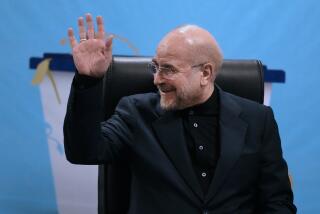Truck Bombing Kills at Least 25 in Shiite Muslim Market
BAGHDAD — An explosives-filled truck blew up in a crowded Shiite Muslim marketplace near the city of Baqubah on Saturday evening, killing at least 25 Iraqis. In two separate attacks, three American soldiers were slain.
The violence came as Iraqi politicians readied themselves for the Dec. 15 parliamentary election. They worked to put the final touches on alliances that remain largely similar to the narrow sectarian and ethnic groupings that defined the Oct. 15 constitutional referendum and last January’s election for an interim National Assembly.
The campaign will begin in earnest after Tuesday, the day political coalitions, parties and individuals draw numbers for ballot positions, which will play a key role in identifying candidates to voters. But over the weekend, politicians began summoning reporters to briefings and outlining their platforms.
Sunni Arabs have been the driving force behind Iraq’s insurgency, and they largely boycotted the January election. But many have vowed to participate in the upcoming vote.
Although some Iraqis thought the Sunnis’ participation in the campaign might curb violence, Saturday’s blast near Baqubah, 35 miles northeast of Baghdad, highlighted the prospect of continuing bloodshed.
The explosives were apparently hidden in a truck filled with boxes of fresh dates. A suicide bomber drove the vehicle to a small marketplace near a Shiite mosque in the crowded agricultural village of Huwaydir, about six miles north of Baqubah.
“No one had suspected that truck because it was carrying boxes of dates, so it was allowed to get into the market without being searched,” said Jaffar Abed Baqi, a 32-year-old farm worker. “The next thing we know, there was a big explosion and huge fireballs everywhere with shrapnel flying.”
The explosion came as villagers were gathering to break the dawn-to-dusk fast observed during the Islamic holy month of Ramadan.
“Our main street was filled with dead bodies, all innocent civilians,” Baqi said. “We then started transferring people to the hospital. We used our cars, police cars and ambulances. But it wasn’t enough.”
At the main hospital in Baqubah, bloodied victims were placed on the floor for lack of beds, and the morgue was filled beyond capacity, witnesses said. In addition to the dead, at least 45 people were injured.
In other violence, the three American soldiers died in two incidents. Two soldiers died when their patrol struck a roadside bomb in southern Baghdad. A third soldier was killed and four were injured when their vehicle struck a landmine near Baiji, 125 miles north of Baghdad.
U.S. forces also launched raids and airstrikes in the western Iraqi town of Husaybah, targeting an alleged leader of the group Al Qaeda in Iraq and other suspected insurgents, the military announced Saturday.
At least 2,015 American military personnel have died in Iraq since the March 2003 U.S.-led invasion. At least eight U.S. military personnel have been killed in Iraq over the last two days, and 83 have died this month.
Despite the ongoing violence, Iraqi political parties have begun preparing for what is quickly becoming a vibrant campaign season.
Several major coalitions have begun revealing details of their platforms, citing corruption and economic development as key concerns.
Election officials said that 21 coalitions and 230 political parties and groups have registered for the December vote, during which Iraqis will cast ballots for the National Assembly as well as provincial governments.
In addition to the two major Kurdish parties, which have renewed their alliance, major campaign players include former Prime Minister Iyad Allawi’s Iraqi List -- a broad secular coalition that includes Communists and Western-style liberals -- and the Shiite-led United Iraqi Alliance, which consists of 17 Islamist groups and dominated the Jan. 30 voting.
Sunni Arab alliances include the Iraqi Accordance Front, which includes Islamist groups and die-hard Arab nationalists; it appears to be the largest Sunni grouping.
Still, Sunnis complain that they face an uphill battle.
“We don’t have bodyguards like the others do,” said Suha Azzawi, a politician running on a smaller Sunni list. “There’s not fair competition. The [incumbent] government will take advantage of their position. They have power over the media.”
Though Iraqis appear ready to vote along the same ethnic and sectarian lines as during the previous parliamentary election, this campaign promises more sophisticated politics. For example, a group of moderate Shiite politicians has broken away from the United Iraqi Alliance to form a parallel group that could draw votes from Allawi’s coalition.
“We have not withdrawn,” said Ali Dabagh, the politician leading the list. “We are going to go in parallel with the alliance.”
Ahmad Chalabi, the former exile leader and onetime favorite of Pentagon war planners who later took up political residence with the United Iraqi Alliance, has also broken off to form his own grouping.
*
Times staff writers Raheem Salman and Caesar Ahmed in Baghdad and a special correspondent in Baqubah contributed to this report.
More to Read
Sign up for Essential California
The most important California stories and recommendations in your inbox every morning.
You may occasionally receive promotional content from the Los Angeles Times.










